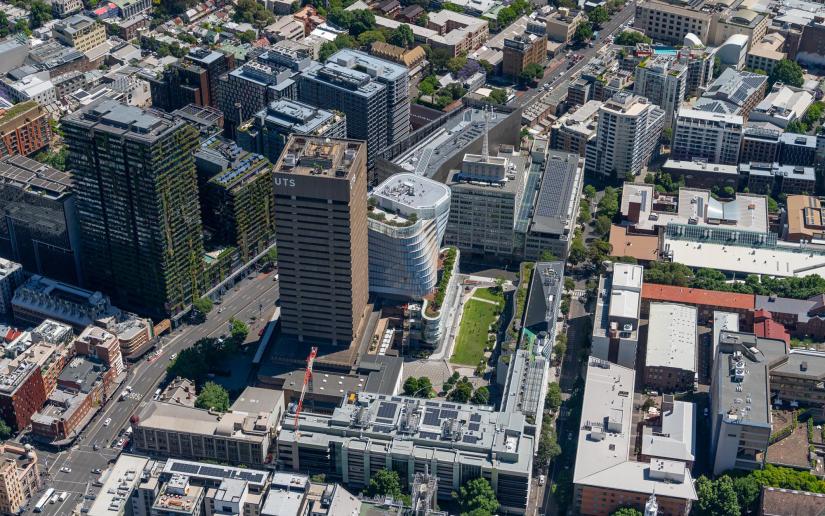UTS is tapping into water sourced from the Altogether wastewater recycling plant, which is located across the road at the Central Park development at Broadway. The water is suitable for irrigation, toilet flushing, cooling towers and other non-drinking uses.
Altogether has the ultimate capacity to produce 900 kilolitres of recycled water each day — enough to fill 2.5 Olympic-size swimming pools every week. The surplus of recycled water will now be pumped across Broadway to UTS Central, dramatically reducing its own potable water use.
“This innovative partnership with the neighbouring plant enabled the UTS Central building to meet its Green Star requirements in the new UTS Central building without having to insatll a massive water tank to capture rainwater that would have reduced the size of the Tech Labs. Not only did this save space and construction costs, recycled water from wastewater is more reliable than from rainwater, particularly in droughts,” said UTS green infrastructure project manager, Jonathan Prendergast.
Until now, water recycling schemes have only delivered water within their immediate precinct.

With many parts of NSW considered drought-affected, water recycling projects that reduce potable water use are increasingly important.
To connect the Altogether plant to the basement of UTS Central, horizontal drills burrowed a path under Broadway to make way for pipes. With the tap officially turned on, recycled water will now flow to the UTS campus to be used for landscaping, toilet flushing, and in cooling towers. Other campus uses are currently being investigated.
“We hope this partnership sets a precedent that will encourage the development of more water recycling projects in urban environments. Altogether is committed to challenging the status quo to deliver sustainable, resilient and financially beneficial utilities solutions that give local communities greater control and this is a perfect example,” said Altogether CEO, Terry Leckie.
It’s expected that the partnership will reduce UTS’s potable water use by around 40,000 kL — or sixteen Olympic swimming pools — each year.
“With many parts of NSW considered drought-affected, water recycling projects that reduce potable water use are increasingly important. In an urban context they have the potential to increase the resilience of neighbourhoods, providing continuous water supply even in dry conditions, while easing the pressure on the regional water network,” said UTS Deputy Vice Chancellor (Resources) Patrick Woods.
Altogether CEO Terry Leckie says UTS’s leadership sets a precedent for others to follow.
“Due to the dense nature of their campus in Broadway, they have had to find new ways to achieve sustainability. While we have many customers of our recycled water services in our precincts around NSW, this is the first time we have been able to export the benefits of recycled water to a customer outside a development precinct.”



 my account
my account pay my bill
pay my bill outages
outages contact us
contact us about us
about us our communities
our communities data solutions
data solutions sustainability
sustainability news
news



